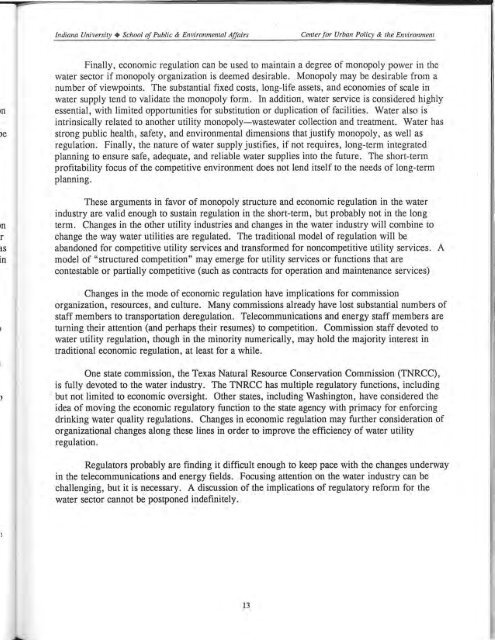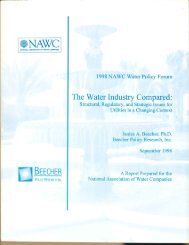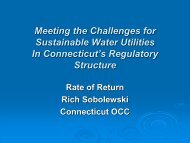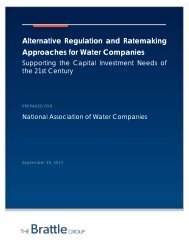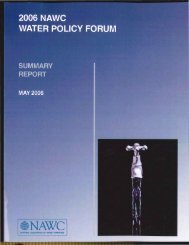CENTER FOR URBAN POLICY AND THE ENVIRONMENT - NAWC
CENTER FOR URBAN POLICY AND THE ENVIRONMENT - NAWC
CENTER FOR URBAN POLICY AND THE ENVIRONMENT - NAWC
You also want an ePaper? Increase the reach of your titles
YUMPU automatically turns print PDFs into web optimized ePapers that Google loves.
Indiana University + School of Public & Environmental AffairsCenter for Urban Policy & the EnvironmentnersFinally, economic regulation can be used to maintain a degree of monopoly power in thewater sector if monopoly organization is deemed desirable. Monopoly may be desirable from anumber of viewpoints. The substantial fixed costs, long-life assets, and economies of scale inwater supply tend to validate the monopoly form. In addition, water service is considered highly ·essential, with limited opportunities for substitution or duplication of facilities. Water also isintrinsically related to another utility monopoly-wastewater collection and treatment. Water hasstrong public health, safety, and environmental dimensions that justify monopoly, as well asregulation. Finally, the nature of water supply justifies, if not requires, long-term integratedplanning to ensure safe, adequate, and reliable water supplies into the future. The short-termprofitability focus of the competitive environment does not lend itself to the needs of long-termplanning.These arguments in favor of monopoly structure and economic regulation in the waterindustry are valid enough to sustain regulation in the short-term, but probably not in the longterm. Changes in the other utility industries and changes in the water industry will combine tochange the way water utilities are regulated. The traditional model of regulation will beabandoned for competitive utility services and transformed for noncompetitive utility services. Amodel of "structured competition" may emerge for utility services or functions that arecontestable or partially competitive (such as contracts for operation and maintenance services)Changes in the mode of economic regulation have implications for commissionorganization, resources, and culture. Many commissions already have lost substantial numbers ofstaff members to transportation deregulation. Telecommunications and energy staff members areturning their attention (and perhaps their resumes) to competition. Commission staff devoted towater utility regulation, though in the minority numerically, may hold the majority interest intraditional economic regulation, at least for a while.One state commission, the Texas Natural Resource Conservation Commission (TNRCC),is fully devoted to the water industry. The TNRCC has multiple regulatory functions, includingbut not limited to economic oversight. Other states, including Washington, have considered theidea of moving the economic regulatory function to the state agency with primacy for enforcingdrinking water quality regulations. Changes in economic regulation may further consideration oforganizational changes along these lines in order to improve the efficiency of water utilityregulation.Regulators probably are finding it difficult enough to keep pace with the changes underwayin the telecommunications and energy fields. Focusing attention on the water industry can bechallenging, but it is necessary . . A discussion of the implications of regulatory reform for thewater sector cannot be postponed indefinitely.13


